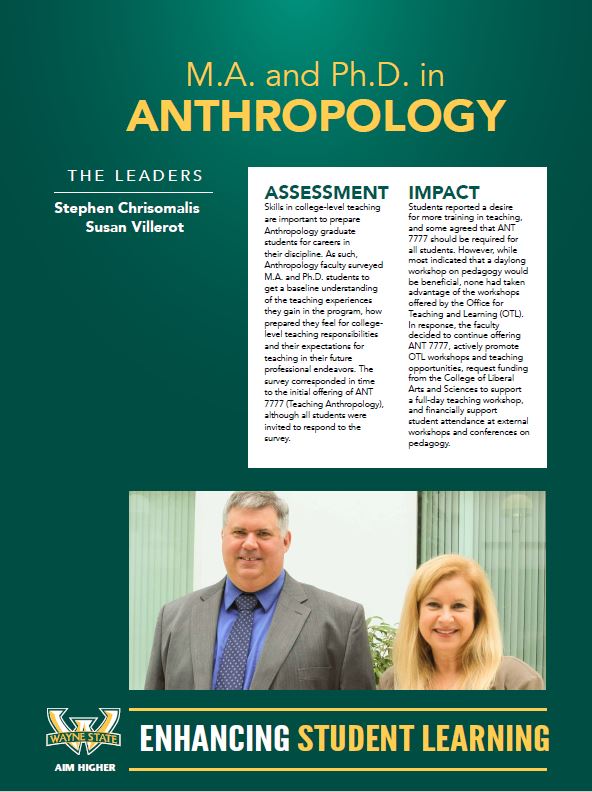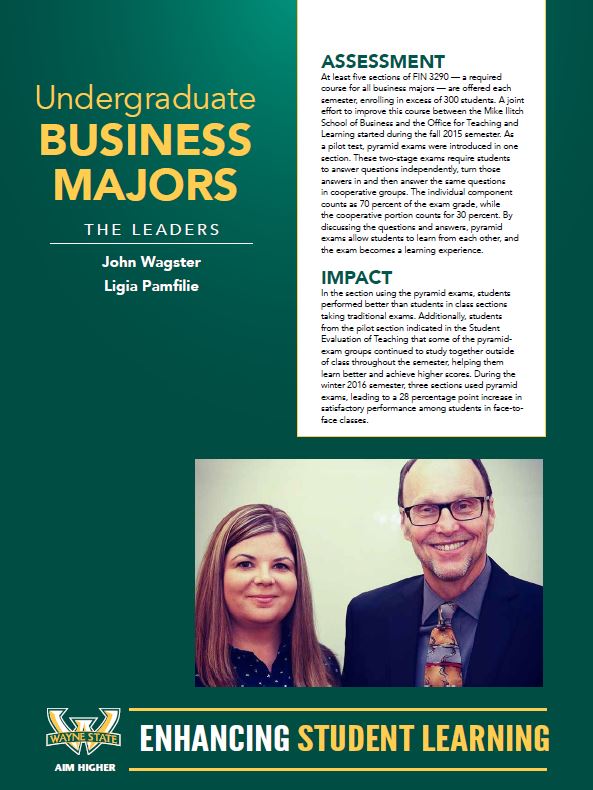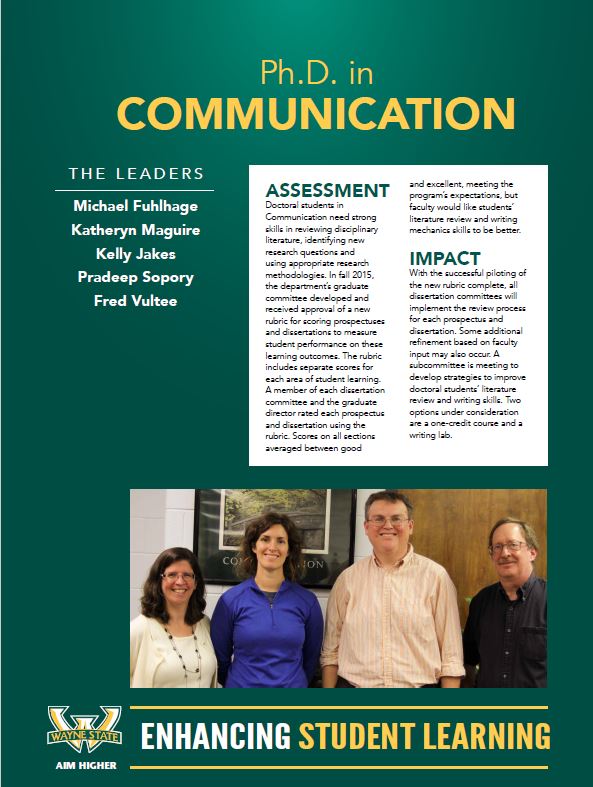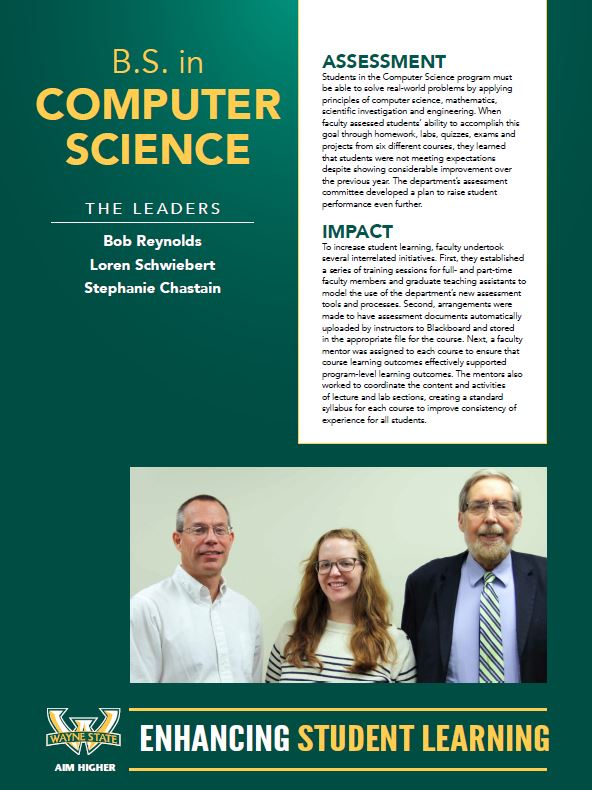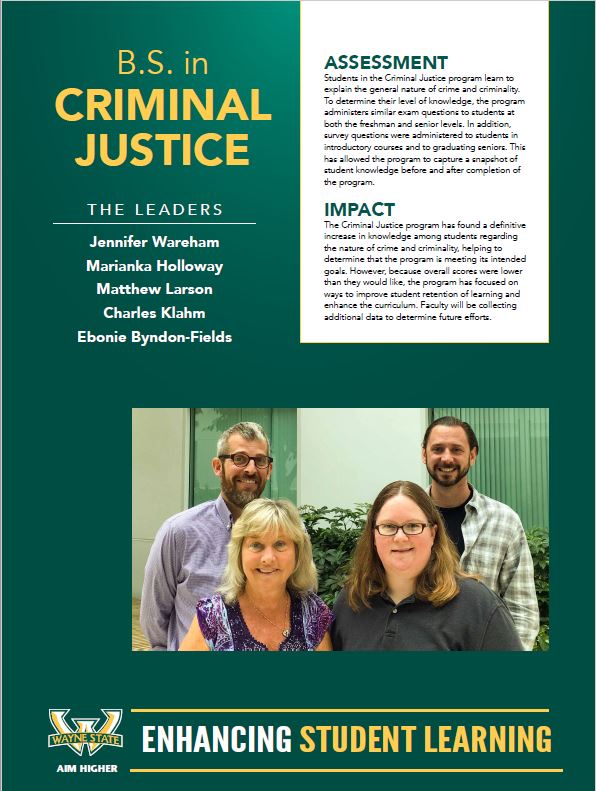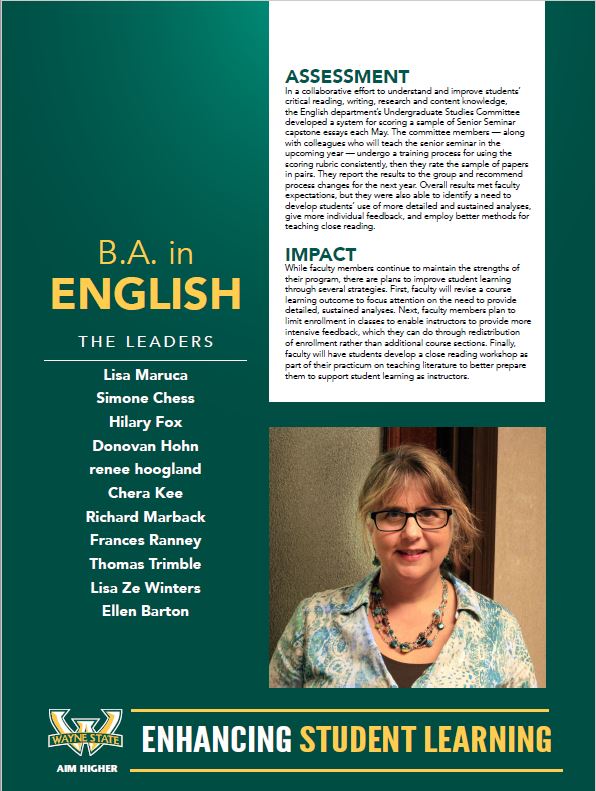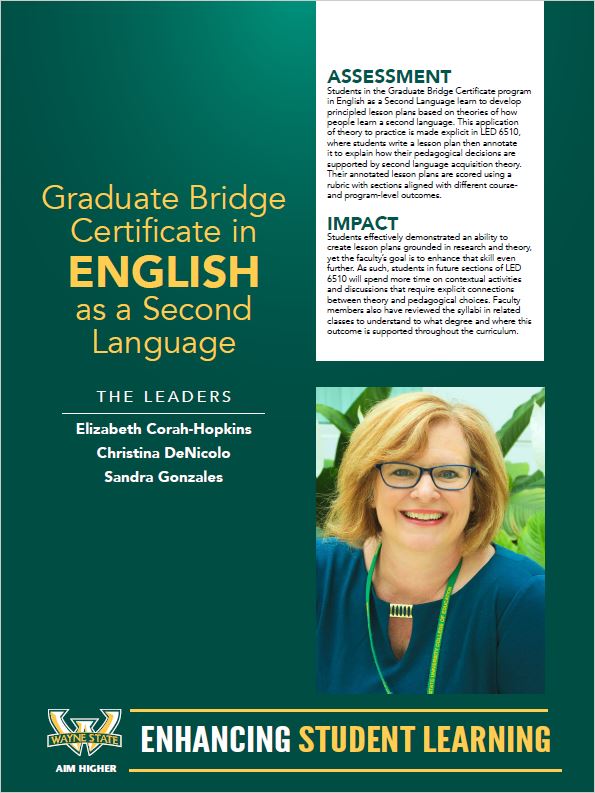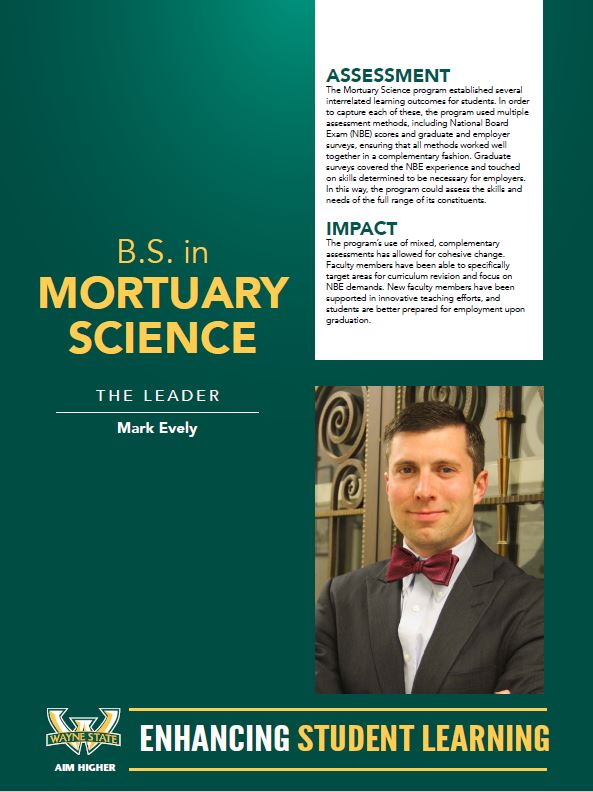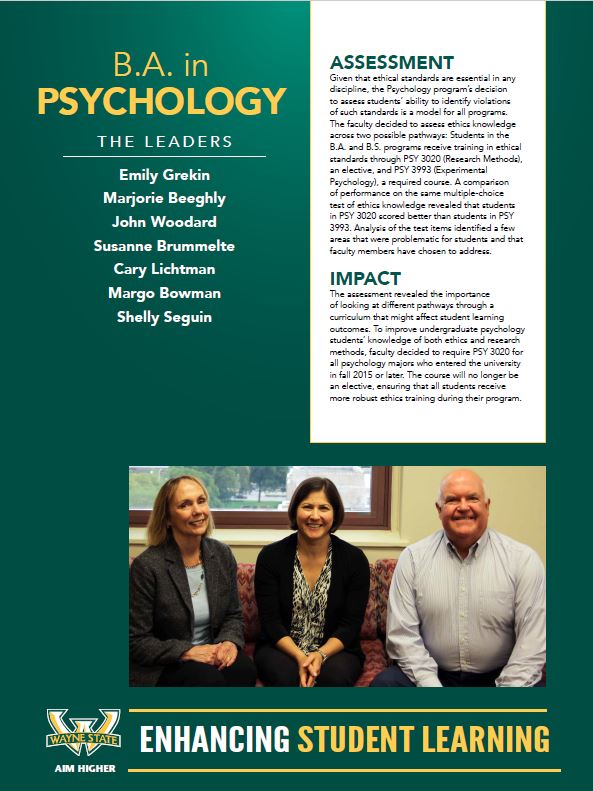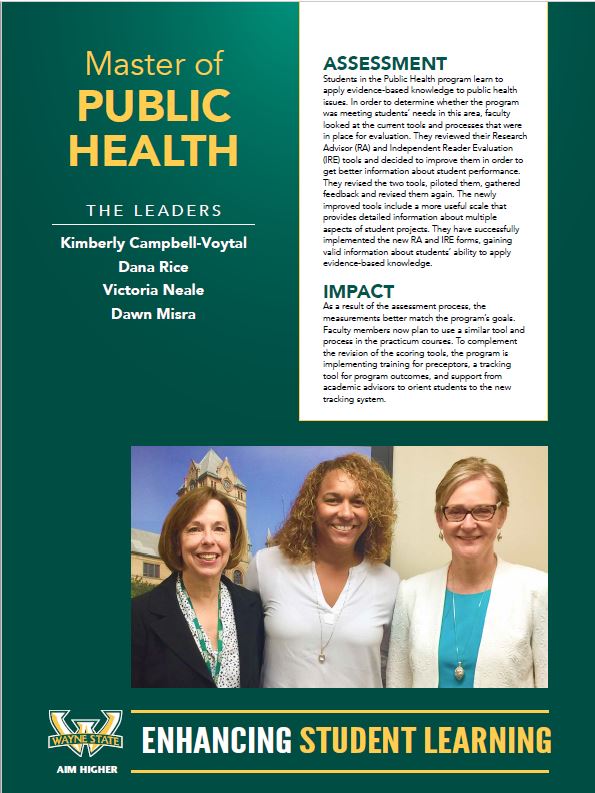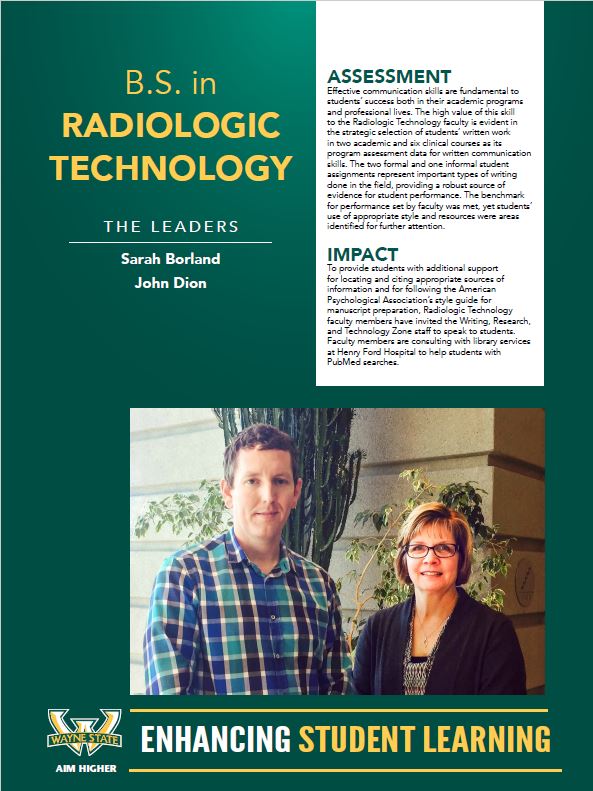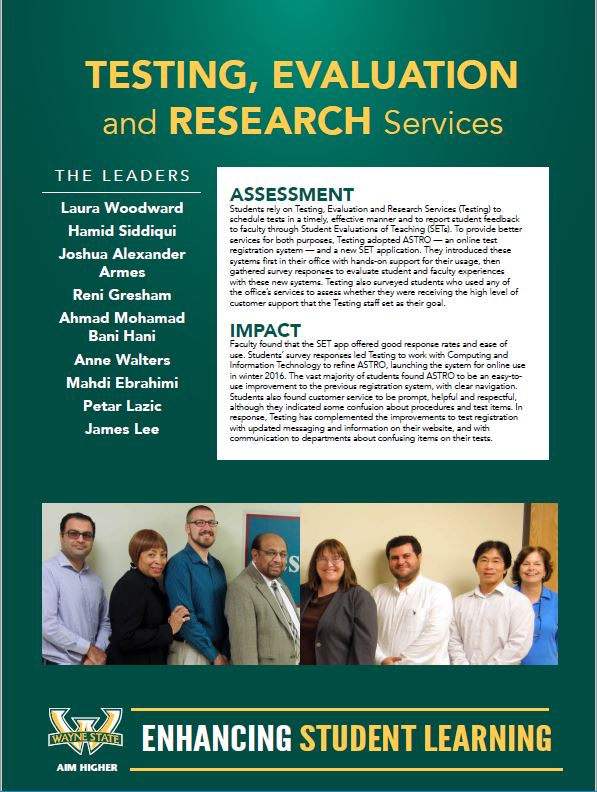Program Assessment Examples 2015 - 2016
Academic program examples
Co-curricular/student services program examples
Posters
| Academic Program Examples | |
| Stephen Chrisomalis and Susan Villerot for MA and PhD in Anthropology:
| |
| John Wagster and Ligia Pamfilie for Undergraduate Business Majors:
| |
| Michael Fulhage, Katheryn Macguire, Kelly Jakes, Pradeep Sopory and Fred Vultee for PhD in Communication:
| |
| Bob Reynolds, Loren Schwiebert and Stephanie Chastain for BS in Computer Science:
| |
| Jennifer Wareham, Marianka Holloway, Matthew Larson, Charles Klahm and Ebonie Byndon-Fields for BS in Criminal Justice:
| |
| Lisa Maruca, Simone Chess, Hilary Fox, Donovan Hohn, renee hoogland, Chera Kee, Richard Marback, Frances Ranney, Thomas Trimble, Lisa Ze-Winters, and Ellen Barton for BA in English:
| |
| Elizabeth Corah-Hopkins, Christina DeNicolo and Sandra Gonzales for Graduate Bridge Certificate in English as a Second Language:
| |
| Mark Evely for BS in Mortuary Science:
| |
| Emily Grekin, Marjorie Beeghly, John Woodard, Susanne Brummelte, Cary Lichtman, Margo Bowman and Shelly Seguin for BA in Psychology:
| |
| Kimberly Campbell-Voytal, Dana Rice, Victoria Neale and Dawn Misra for Master of Public Health:
| |
| Sarah Borland and John Dion for BS in Radiologic Technology:
| |
| Student Services Example | |
| Laura Woodward, Hamid Siddiqui, Joshua Alexander Armes, Reni Gresham, Ahmad Mohamad Bani Hani, Anne Walters, Mahdi Ebrahimi, Petar Lazic, James Lee for Testing, Evaluation and Research Services:
|
TABLE TENTS
Karen Myhr and Lori Pile for BA and BS in Biological Sciences:
- Learning outcome assessed: Students apply the process of science.
- Assessment method: A sample of term papers across three writing intensive courses.
- Written narrative: (PDF)
Jeff Pruchnic and Thomas Trimble for Composition Program:
- Learning outcomes assessed: Students compose persuasive academic genres using a reflective research process.
- Assessment method: An end-of-semester reflective essay in ENG 1020 scored using a common rubric
- Written narrative: (PDF)
Bob Reynolds for PhD in Computer Science:
- Learning outcome assessed: Incoming students demonstrate core knowledge of data structures, advanced programming, and fundamental mathematical concepts.
- Assessment method: Proficiency exam
- Written narrative: (PDF)
Ece Yaprak and Emmanuel Ssemakula for BS in Computer Technology:
- Learning outcome assessed: Students select and apply knowledge, techniques, skills and tools to engineering activities.
- Assessment method: Specific exam and lab questions that align with the learning outcome across multiple courses
- Written narrative: (PDF)
Neva Nahan and Elizabeth Janks for Graduate Certificate in Developmental Disabilities:
- Learning outcome assessed: Students employ self-awareness and intercultural sensitivity in relation to disability to support full community inclusion.
- Assessment method: Synthesis paper in SW 6700
- Written narrative: (PDF)
Mark Larson for MEd in Early Childhood Education:
- Learning outcome assessed: Students employ critical reading, analysis and application skills to guide their pedagogical decisions.
- Assessment method: Selected rubric scores for an annotated bibliography assignment from ELE 6020
- Written narrative: (PDF)
Fred Vultee an Elizabeth Stoycheff for BA in Journalism:
- Learning outcome assessed: Students present information inaccurate, concise, and grammatically correct ways.
- Assessment method: Grammar competency exams given as pre- and posttests
- Written narrative: (PDF)
Marsha Richmond and Betsy Lublin for BA in History:
- Learning outcome assessed: Students compare histories of diverse geographical regions and their development over time.
- Assessment method: Students' capstone research and capstone survey
- Written narrative: (PDF)
Gina DeBlase and Poonam Arya for Ed.D. in Reading, Language, and Literature:
- Learning outcome assessed: Students analyze and critique disciplinary research.
- Assessment method: Rubric applied to student critiques of a research article
- Written narrative (PDF)
Shelly Najor for BA in Public Relations:
- Learning outcome assessed: Students prepare appropriate communications materials for use in all media (print and digital).
- Assessment method: Student portfolios
- Written narrative (PDF)
Robert Conway, Wendy Matthews, Gail Gebhart, Ann Marie Koukois, and Stanley Waldon for BA in Music:
- Learning outcome assessed: Students demonstrate functional keyboarding skills.
- Assessment method: Common rubric with multiple sections for the range of techniques needed
- Written narrative (PDF)
Eric Ash for MA and PhD in History:
- Learning outcomes assessed: Students locate and analyze sources, and describe and explain events, historiography, historical argument, and professional standards.
- Assessment method: Rubric scores from theses, essays, and dissertations
- Written narrative (PDF)
Neva Nahan and Karen Weiner for Graduate Certificate in Temporary Approval for Michigan School Social Workers:
- Learning outcome assessed: Students apply legal and ethical standards to social work practice in school settings.
- Assessment method: Exam in SW 8180
- Written narrative (PDF)
Co-curricular/Student Services Program Examples
Jeanine Bessette for Housing and Residential Life:
- Learning outcome assessed: Resident Assistants help residents make personal connections, identify campus resources, and resolve problems, and provide programming to support student success.
- Assessment method: EBI survey and a floor chart quiz
- Written narrative: (PDF)
Mike Quattro for Satellite Campuses:
- Program outcomes assessed: Satellite campuses will expand students' opportunities to take courses and complete their studies while providing access to high-quality resources and support services.
- Assessment method: Available services tally and student satisfaction survey
- Written narrative (PDF)
Doug Freed and Jo Bains for Transfer Student Success Center:
- Program outcome assessed: The TSSC provides transfer students with easy access to information and assistance in transitioning to WSU.
- Assessment method: Student contact tracking
- Written narrative (PDF)
